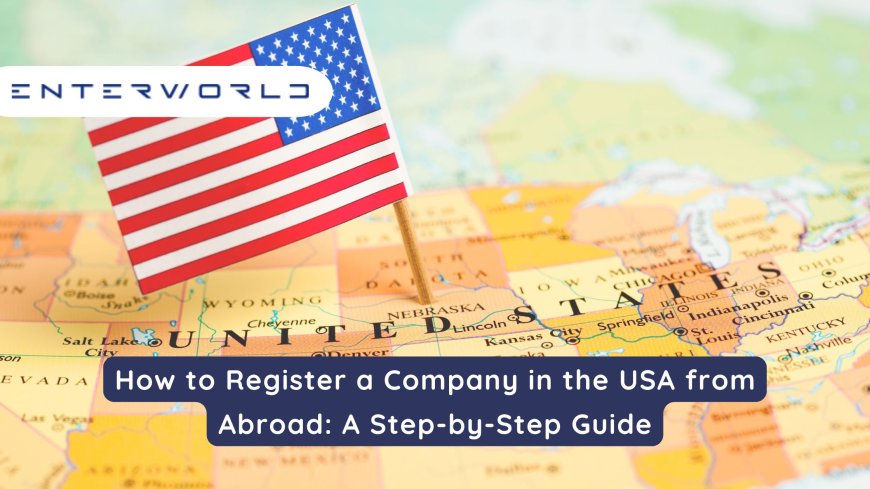How to Register a Company in the USA from Abroad: A Step-by-Step Guide
Learn how to register a company in the USA from abroad. This complete guide covers legal requirements, state selection, and practical steps for non-resident entrepreneurs.

The United States remains one of the most attractive destinations for entrepreneurs worldwide. With its large consumer market, favorable legal framework, and access to global capital, starting a business in the U.S. can significantly boost your brand’s credibility and growth potential. But what if you're not a U.S. citizen or resident?
The good news: You can register a company in the USA from abroad. Thousands of foreign founders do it every year. In this guide, we’ll walk you through every step—from choosing a state to registering your company, setting up a U.S. bank account, and staying compliant.
Why Start a Business in the USA as a Non-Resident?
Before diving into the “how,” let’s understand the “why.” Many international entrepreneurs choose the U.S. for:
-
Access to global investors and VCs
-
A business-friendly legal environment
-
Strong intellectual property protection
-
World-class infrastructure and talent
-
Enhanced brand trust and credibility
Whether you plan to serve U.S. customers or simply want a U.S.-registered company for international credibility, the process is easier than you might expect.
Step 1: Choose the Right Business Structure
The two most common legal entities used by non-residents are:
1. Limited Liability Company (LLC)
-
Easier to manage
-
Pass-through taxation
-
No requirement for U.S. shareholders
2. C Corporation
-
Required if you're seeking venture capital funding
-
Suitable for large-scale operations
-
Separate legal entity from shareholders
LLCs are typically the best choice for small and medium foreign-owned businesses due to their simplicity and tax benefits.
Step 2: Select the Best State for Incorporation
The U.S. has 50 states, each with different rules, taxes, and incorporation fees. The top states for non-resident company registration include:
-
Delaware: Preferred for tech startups and C corporations due to flexible corporate laws.
-
Wyoming: Offers low fees and no state income tax; good for LLCs.
-
Florida and Texas: Ideal if you plan to do business within those states.
Pro tip: If you don’t have a physical presence in the U.S., consider incorporating in Delaware or Wyoming.
Step 3: Hire a Registered Agent
A Registered Agent is a person or company located in the state of formation who can receive legal documents on your behalf. It’s mandatory for all U.S. companies.
You can’t use a foreign address. Most incorporation services offer registered agent services for $50–$150/year.
Step 4: File Formation Documents
Depending on the state and business type, you will file:
-
Articles of Organization (for LLCs)
-
Articles of Incorporation (for C Corporations)
You’ll need to provide:
-
Company name
-
Registered agent’s address
-
Business purpose
-
Details of members/directors
You can file online via the Secretary of State’s website or use an incorporation service provider.
Step 5: Get an EIN (Employer Identification Number)
The EIN is your company’s tax identification number issued by the Internal Revenue Service (IRS). It’s essential for:
-
Opening a U.S. bank account
-
Filing taxes
-
Hiring employees
How to get an EIN as a non-resident:
You can apply using Form SS-4. Since you don’t have a U.S. Social Security Number, you must submit the form via fax or mail to the IRS. Processing usually takes 4–6 weeks.
Alternatively, many formation agents offer EIN services to speed things up.
Step 6: Open a U.S. Business Bank Account
Opening a U.S. bank account can be the most challenging step for non-residents. Most banks require:
-
EIN
-
Passport or ID
-
Articles of Organization/Incorporation
-
U.S. address (sometimes a virtual office works)
-
Personal visit (though some fintech platforms allow remote setup)
Fintech alternatives:
-
Mercury
-
Relay
-
Wise Business
These services are often more accessible for international founders and integrate easily with global payment systems.
Step 7: Comply with U.S. Tax Laws
As a foreign-owned U.S. business, you must meet federal and state tax obligations, which may include:
-
Federal Income Tax: Even if you operate from abroad, U.S.-sourced income is taxable.
-
State Taxes: Depending on your chosen state.
-
Annual Franchise Tax: Required in states like Delaware and California.
-
Filing Form 5472: Required if you’re a single-member foreign-owned LLC.
It’s highly recommended to work with a U.S. tax advisor who understands international compliance.
Step 8: Obtain Licenses and Permits (If Required)
Depending on your business type and target market, you may need:
-
Business licenses
-
Sales tax permits
-
Import/export registrations
Each state and industry has its own requirements. Check with the local Secretary of State or Department of Revenue.
Step 9: Set Up Your Mailing and Virtual Office
Since you’re not based in the U.S., consider:
-
Virtual business address services
-
Mail forwarding and document scanning
-
VoIP phone numbers with U.S. area codes
Services like Regus, iPostal1, and Opus Virtual Offices offer affordable packages for global entrepreneurs.
Step 10: Maintain Ongoing Compliance
Once your company is formed, you’ll need to maintain good standing by:
-
Filing annual reports
-
Paying state fees and franchise taxes
-
Maintaining a registered agent
-
Filing yearly federal and state tax returns
Non-compliance can lead to penalties or company dissolution. A compliance calendar or professional service can help you stay organized.
FAQs
1. Can I register a company in the U.S. without being a citizen?
Yes, non-residents and non-citizens can register and own a U.S. company. There is no citizenship requirement to start a business in the U.S.
2. Do I need to visit the U.S. to register my company?
No, you can form the company remotely, but opening a traditional U.S. bank account may require a personal visit. Fintech solutions may allow remote banking.
3. What’s the best state to register my company?
Delaware is popular for corporations due to investor-friendly laws. Wyoming and New Mexico are cost-effective for LLCs. If you plan to do business in a specific state, register there.
Final Thoughts
Starting a business in the U.S. as a non-resident is entirely possible—and often easier than people assume. With the right planning, tools, and guidance, you can register a company in the USA from abroad and tap into one of the world’s most dynamic markets.
From choosing your business structure to ensuring tax compliance, each step is critical. Working with reputable service providers and accountants who understand international business can save you time, reduce risk, and accelerate your success.








































































































![Building A Digital PR Strategy: 10 Essential Steps for Beginners [With Examples]](https://buzzsumo.com/wp-content/uploads/2023/09/Building-A-Digital-PR-Strategy-10-Essential-Steps-for-Beginners-With-Examples-bblog-masthead.jpg)




















































